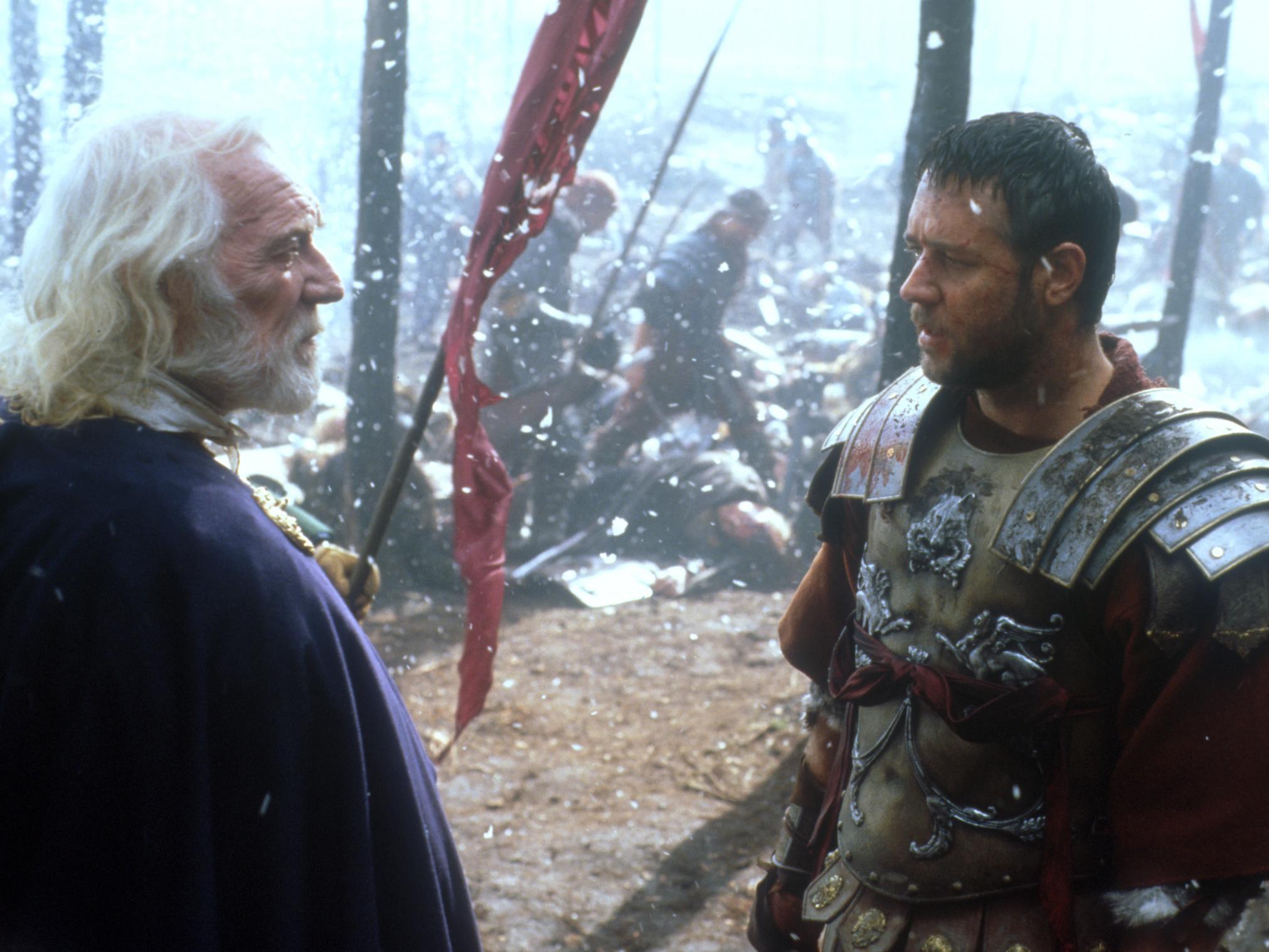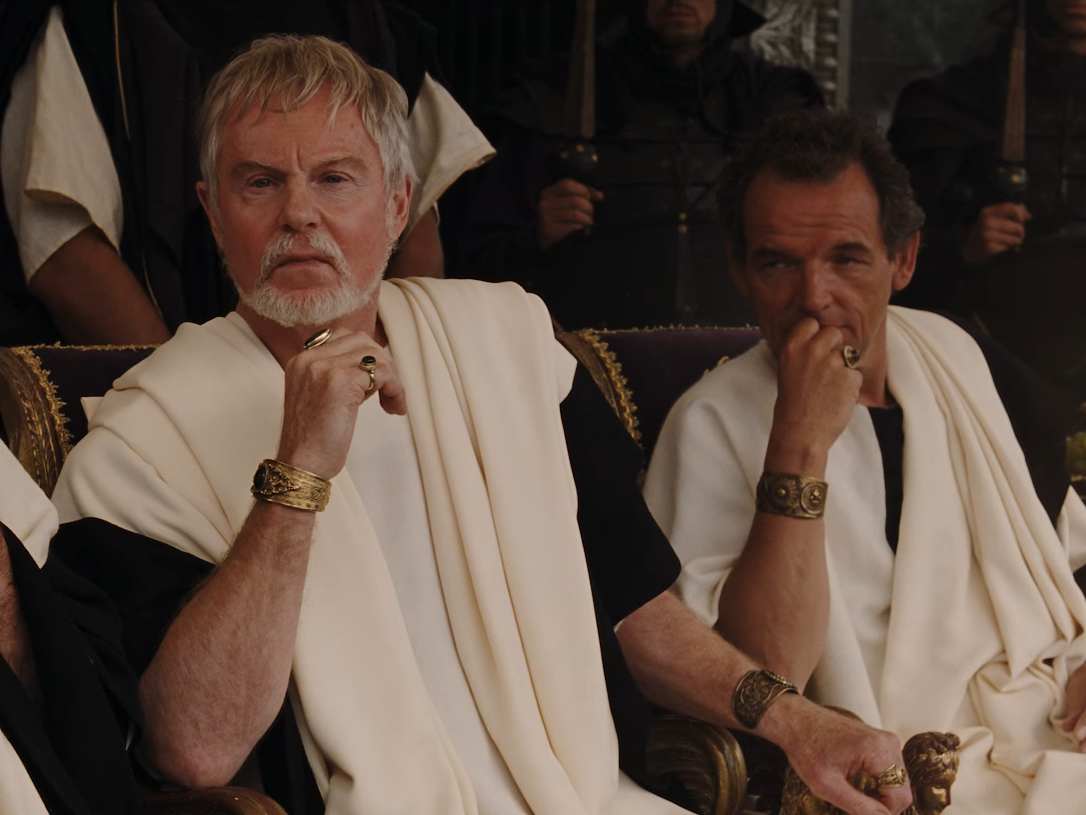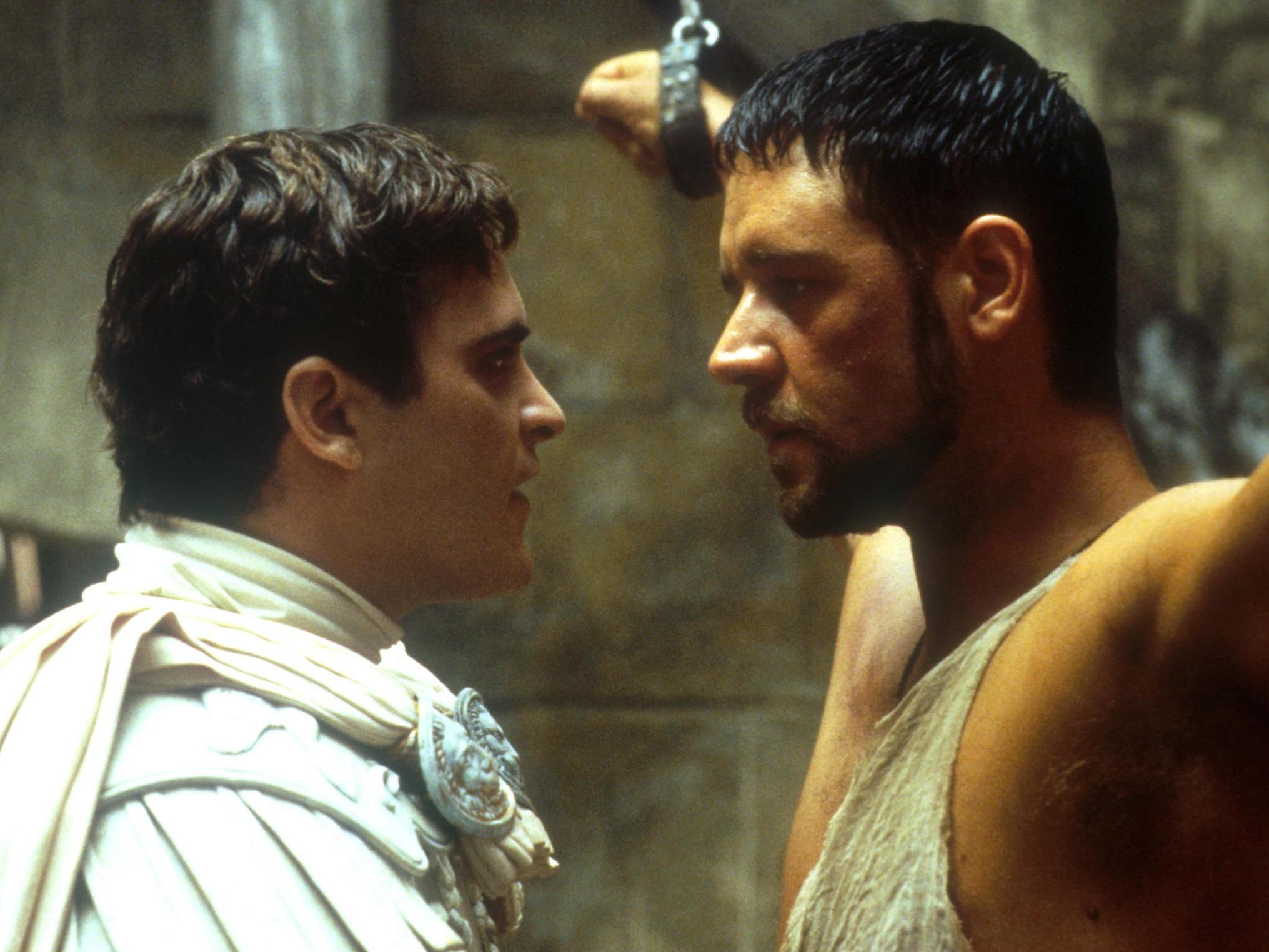Broken bones, the death of a star, tigers on the loose: The story behind Ridley Scott’s Gladiator
Scott’s mid-career epic had to overcome a uniquely chaotic production to reach Oscar glory. But as the thrilling sword-and-sandal flick turns 20, Geoffrey Macnab learns that its cast always sensed they were onto something special

The tigers threatened to get loose. One of the leading actors died before the shoot was over after a mammoth drinking session in a Malta pub. The script was a work in progress, with a writer in a caravan churning out new pages every day. The star sustained multiple injuries during the fight scenes, snapping tendons out of sockets and breaking bones. Ridley Scott’s Gladiator, released on 12 May 2000 and now celebrating its 20th anniversary, won five Oscars and is considered a bona fide modern-day classic, but was hatched in circumstances that seemed chaotic in the extreme. Speak to anyone involved, though, and you’ll discover they all knew they were making something special.
This is the epic, bloody, testosterone-filled story of Maximus (Russell Crowe), the Roman military commander betrayed by Commodus (Joaquin Phoenix in lisping, malevolent form). The emperor (Richard Harris) he serves is assassinated; his wife and son are massacred. He is forced into slavery before becoming Rome’s most popular and lethal gladiator. “I will have my vengeance, in this life or the next!” he snarls at Commodus in the film’s most rousing scene.
The director had first become intrigued by the project after producers Walter Parkes and Doug Wick showed him a copy of Jean-Léon Gérôme’s 1872 painting, Pollice Verso. It depicts a gladiator standing with his foot on the neck of a vanquished opponent, looking up at the bloodthirsty crowds, waiting for the thumbs up or thumbs down signal. Scott, the ferociously driven director of such movies as Alien and Blade Runner, was instantly hooked. “The image spoke to me of the Roman empire in all its glory and wickedness,” he commented in the Gladiator: Making of an Epic book published to tie in with the film’s release. “What I love to do – apart from getting a good script and making movies – where I enjoy myself most, I think, is creating worlds.”
Crowe won an Oscar for his belligerent performance. The influence of Gladiator has been felt ever since. Its mix of “brutality, scale and scope” was an acknowledged influence on David Benioff and DB Weiss’s TV adaptation of Game of Thrones. The film also rescued the reputation of the sword-and-sandal movie, a genre that, since the glory days of Ben-Hur and Spartacus, had fallen into disrepute. Gladiator had a Wagnerian sweep, accentuated by Hans Zimmer’s brooding score and by the conviction with which Crowe uttered lines like, “At my signal, unleash hell”, while glowering at the camera in a rabid fury. This was one Roman movie that didn’t flirt with kitsch.
Scott’s immersive ambition matched that found in old Cecil B De Mille’s most extravagant features. Newcomers to the set marvelled at the lengths to which the director and his collaborators had gone to recreate the Roman empire in AD180.

British comedian and actor Omid Djalili recalls walking onto the set in Morocco for the first time and being astounded by what he saw. His main scene takes place in the middle of the marketplace in the Roman province of Zucchabar. Extras were everywhere. There was bustle and commotion in every corner of the set.
“It is so packed. There is smoke, there is people. After the first take, Ridley Scott said we have one second of dead time. I need a dog or a midget,” Djalili tells The Independent. Both were provided instantly, simply to add to the background atmosphere. “That is what [Scott] demanded. I think it is because of his background in advertising. Every shot has to be golden.”
The comedian asked why they needed those people milling around as well as taverns and market stalls with hundreds of grapefruits and oranges, given that his scene was being shot largely in close up. Scott responded: “The camera never lies. You have to pack everything full of detail.”
“One was impressed by the size of everything, the epic quality of everything,” agrees Derek Jacobi, who played the pivotal role of the Roman senator, Gracchus. “You couldn’t walk on the set of the Forum or the Colosseum and not say, ‘Wow! this is something’.”

Watch Apple TV+ free for 7 day
New subscribers only. £9.99/mo. after free trial. Plan auto-renews until cancelled.
ADVERTISEMENT. If you sign up to this service we will earn commission. This revenue helps to fund journalism across The Independent.

Watch Apple TV+ free for 7 day
New subscribers only. £9.99/mo. after free trial. Plan auto-renews until cancelled.
ADVERTISEMENT. If you sign up to this service we will earn commission. This revenue helps to fund journalism across The Independent.
Jacobi and the actors cast as the other senators spent many days as spectators in the Colosseum, “reacting to tigers being killed and all that kind of carry on”. The tigers were doped. “They weren’t working at full capacity,” remembers Jacobi, who is currently on screen in crime thriller The Host. Even so, there were hair-raising moments when the animals broke free of their shackles and, as Djalili puts it, “everyone ran for their lives”.
The actors playing the gladiators were, Jacobi recalls, “huge fellows. I mean they had legs up to their armpits. They were vast, built like brick s***houses. They were going at it. One watched daily as they hacked each other to death. It was very exciting.”

In the middle of all the mayhem was Crowe. The Australian still has scars from the combat today and is said to have cracked a hip bone and broken a foot bone as he took on all comers and tussled with the tigers. Scott recently told Variety that Crowe was nearly mauled by one of the tigers. “You’ve got two guys on a chain with a ring in the floor to control it. Russell said, ‘OK, release them’ and when Russell would fall back, the tiger would come out of the hole and Russell would roll out of the way and he said, ‘F*** me, that was close’,” the director recalled.
Gladiator had three different writers. They all shared the eventual Oscar nomination. David Franzoni came up with the idea and wrote several drafts. Then, John Logan (whose later credits include Bond films Skyfall and Spectre and Martin Scorsese’s The Aviator and Hugo) wrote several more drafts. These were satisfactory enough for the producers to start spending money on sets. Ridley Scott was put on a “pay or play” deal (guaranteeing he would be paid whether or not the movie went ahead). Actors were also hired.
Crowe wasn’t then a huge star. He had received an Oscar nomination for playing the paunchy tobacco industry whistleblower in The Insider (1999) and was widely admired for his performances as the skinhead in his early Australian film Romper Stomper (1992) and as a hardbitten cop opposite Kim Basinger in LA Confidential (1997). He may have been a risk as Maximus but, as the producers put it, he had the “strength, gravity and force” to carry off the role.
Not that the Australian was easy to work with. At a cast reading four weeks before shooting was due to start, Crowe made it clear he wasn’t satisfied with the script. British writer William Nicholson, who had been working with producer Doug Wick on another project, was asked to take a look. He made some suggestions about possible improvements and was promptly hired. “I was brought on as something called a production rewriter, which is an odd beast,” Nicholson says. “It’s not something I usually do but I liked Doug [Wick] and he was in quite a serious pickle. In my arrogance or folly, I thought I knew how to fix it [the script].”
Nicholson expected to do the work quickly and uncredited. “I was helping out and having some fun. I read the script and I could see very clearly that the problem was you had a protagonist who was an angry killer, bent on revenge. You couldn’t empathise, you couldn’t like him.”

He looked for ways to heighten the audience’s “emotional engagement” with Maximus. “Why don’t we make it, from the beginning, that this guy, far from being a superb soldier and fighting machine, is a farmer. He is somebody who loves more than anything his home, his farm, his wife, his child. That’s what he wants. He doesn’t want to be a battle-winning general. He just happens to be very good at it. He doesn’t want to be a gladiator.”
Nicholson built in the character’s longing for the afterlife where he can be reunited with his beloved wife and son. He gave the film a soulfulness alongside its bloodletting and violence.
The writer was on set throughout production in Malta and Morocco, working away furiously in a caravan behind the scenes. “All the way through, I was rewriting as they were shooting,” he says. “I was there with a laptop. I was pumping out scenes. I would talk them through with Ridley at lunchtime and then we would have an evening phone call with the Los Angeles people. We were flying by the seat of our pants the whole time. The design department would come to me saying, ‘What is happening with the bath house scene?’ and I would say, ‘But there isn’t a bath house scene’.”
Gladiator evolved as it went along. When the filmmakers realised that Joaquin Phoenix was giving an extraordinary performance as the endlessly devious Commodus, they could adjust the screenplay and feature him yet more prominently. Phoenix later likened his character to “a spoiled child … vulnerable and sad one minute and throwing a tantrum the next”.
One major problem came with the death of Oliver Reed, then aged 61, before filming was finished. Reed was playing Proximo, the gladiator trainer who takes on Maximus. Everybody knew the stories about him, the notorious hellraiser who was angelic when sober and a devil when drunk. His collaborators, though, testify to how well he behaved on set. They all liked him, except for Crowe.

The amiability froze whenever Reed was in Crowe’s presence. “He (Reed) told me something like, ‘I don’t really get on with him (Crowe)’, Djalili recalls. “I asked why not. He said, ‘He reminds me too much of myself when I was younger. He is just like me. He is a drinker, a wild man and he doesn’t take any crap’. He said, ‘I can’t be around people like that, could you?’. He was always very humorous about it but I do know that when we had one scene together, they didn’t speak. There were three chairs. I was sat next to him (Reed) and Russell Crowe was sat quite far away.”
Reed and Crowe may have disliked each other intensely but their scenes together are poignant and intense. Both are exceptional. Reed’s Proximo is calculating and hardbitten but we can always sense his underlying decency. Crowe is relentless but with a fatalism and introspective quality that makes him more than just a killer.
Djalili plays a slave trader who has his testicles squeezed by Proximo after selling him “queer giraffes”. He was terrified of Reed before they met, but the crew played a trick on him. They persuaded Reed to grab Djalili by the genitals rather than hit him in the face, as was in the script.
“I was very intimidated. I think they were trying to make me feel a bit more part of the team,” the comedian remembers. “He (Reed) was one of the most emotionally empathetic people I had ever worked with. He was so loved. Every time we walked from one set to another, he always had something to say to the crew. He knew all their names. He was extremely kind.”
Jacobi, who had worked with Reed before, agrees that the old devil could be very ingratiating and charming. “He was an extraordinary creature. When sober, he was the gentlest, mildest, most loving gentleman you could meet… when he was drunk, he was a different person. He could be dangerous. I remember a time in Malta when they cleared the bar because Ollie was in there, in one of his bad drunk moods and would only let in me and John Shrapnel because we were friendly enough to calm him down.”
The weekend Reed died, he had been on a bender. The story is that he was accosted by sailors in The Pub, a bar in Valletta. He had gone for a quiet drink and ended up taking on the sailors in a prolonged drinking competition and later had a heart attack. “One Sunday morning, he dropped down dead on the floor of a pub. He probably had a couple of pints and said, ‘I don’t feel good’, laid on the carpet and died,” Scott recently commented.

By then, Nicholson had just gone home. “I had hardly landed when the phone rang and I was told Oliver Reed has died, come back.” They hadn’t yet shot Reed’s final, redemptive scene in which he was supposed to go into the arena after Crowe’s death, plant a wooden sword in the sand and say “free at last”, or words to that effect.
Nicholson rushed back to Malta. The script was tweaked yet again with Maximus’s fellow gladiator, Juba (Djimon Hounsou), going into the Colosseum at the end of the film. Nicholson wrote a new ending for Reed that was filmed using out-takes, a body double and CGI.
With its 12 Oscar nominations and Best Picture award, the resulting film was a triumph, just as everybody working on it always knew it would be. It grossed more than $460m worldwide. Strangely, some critics carped. The New York Times complained about its “inhuman, glossy style”, while Roger Ebert, taking a different tack, called it “muddy, fuzzy and indistinct”. However, most reviewers gave the thumbs up and the film’s reputation has grown over the years.
Gladiator saw Ridley Scott at full throttle. The British director pushed all his collaborators, from the writers to the technicians and stars, to perform at the peak of their abilities. You can’t help but marvel at his virtuoso handling of the big action set pieces. The opening battle is as intricately shot and edited, and as visceral and violent, as anything in contemporary war movies like Apocalypse Now or Platoon. At the same time that he filled the screen with blood and thunder, Scott gave his actors the chance to excel. Unafraid of improvisation, he would always allow them one take in which they could do whatever they wanted. He trusted them, keeping rehearsal to a minimum and avoiding lengthy explanations of character motivation or psychology. The fact that he had cast them, he would explain, meant that he had complete confidence in them.
“When you have been in a film like that, it does affect you,” says Djalili. “You can see the levels of excellence that you should be striving for. Every single department on that film strove for that level of excellence.”
Reflecting on the eventful shoot, Crowe recently told Variety that whenever he sees Scott, he likes to quip to him: “One of these days we should actually do a film where we know what we’re going to do before we start.”
A sequel is now in the works, set 25 years later. It doesn’t seem the most promising idea but, then again, nor did the original and look how that turned out.
Gladiator is available to stream on Amazon. Derek Jacobi’s new thriller, The Host, is out now on iTunes, Amazon Prime, Google Play, Apple TV, Microsoft Movies and TV and Fandango Now.
Join our commenting forum
Join thought-provoking conversations, follow other Independent readers and see their replies
Comments
Bookmark popover
Removed from bookmarks